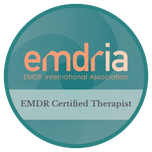Catherine M. Blake, MA, LPC, Certified Therapist in EMDR
The Highly Sensitive Person
Are You Highly Sensitive?
You Are Not Alone Being “sensitive” can be a curse, it can also be a gift! You may be among the 15-20% of the population who are highly sensitive (an HSP). If so, know that your trait is normal, innate. In fact, biologists have found it to be in most or all animals, from fruit flies and fish to dogs, cats, horses, and primates. High sensitivity is a survival strategy, being observant before acting. The brains of HSPs work a little differently than others. Sensitivity Brings Greater Awareness And Deeper Reflection An HSP is more aware than others of subtleties because your brain processes information and reflects on it more deeply. If you notice everything, you may become overstimulated when life becomes too intense, complex, chaotic, or novel for a long time. This trait is not new, but it has been misunderstood. Because HSPs prefer to look before entering new situations, they are often called "shy." But shyness is learned, not innate. In fact, 30% of HSPs are extraverts, although the trait is often mislabeled as introversion. It has also been called inhibitedness, fearfulness, or neuroticism. Some HSPs behave in these ways, but it is not innate to do so and not the underlying trait. For more information and a short test you can take, go to Elaine Aron, Ph.D.’s website: www.hsperson.com |
How I Help Highly Sensitive PeopleSafe Environment
I specialize in working with highly sensitive people. First, I provide a non-threatening, accepting environment which can calm your nervous system and help you relax. Your body can do this and knows how, with the proper tools, support, and guidance. I offer a broad palette of techniques and actions – some of which will be just what you need to calm things down and enjoy the positive aspects of your sensitivity. My approach is gentle, laid back or more structured, depending on your needs. Your body posture, awareness, and issues tell me a lot about how to best guide you in healing. External Factors: Events and Triggers Next, we identify the source or sources of your challenges. Some people are going through a life transition, such as divorce, separation, career change. Others have had a life-threatening event (a flood, car accident, illness) which shakes their world. Maybe both are happening at once! I can help with single-event issues or those that have been more persistent or earlier in life. Maybe you were adopted or had different caregivers as you were growing up. Some of us have been more aware all our lives. We notice things that others don’t. I check to see if your nervous system is more in-tune and aware of the environment. Healing and Empowerment
For most highly sensitive people, empowerment, boundary-setting, increasing self-esteem and coping skills help you heal yourself – the ultimate goal. Healing Trauma with EMDR and Sensorimotor Psychotherapy For those who have experienced trauma, I use two methods to help you release the anxiety which the body holds: you can be more resilient. I use EMDR (Eye Movement Desensitization – see EMDR counseling for more information) and Sensorimotor Psychotherapy (SPI) – see sensorimotorpsychotherapy.org for my listing and description of how it works. Finding Happiness and Peace The good news is that with the right learning/healing environment, you can have a happier, more fulfilling life than less-sensitive people. In my experience, highly sensitive people care deeply: about themselves, their family, their community, and their world (not necessarily in that order!). Learning to keep out what you don’t want and embrace that which you do want can help you get your needs met and find peace within your Self. |


